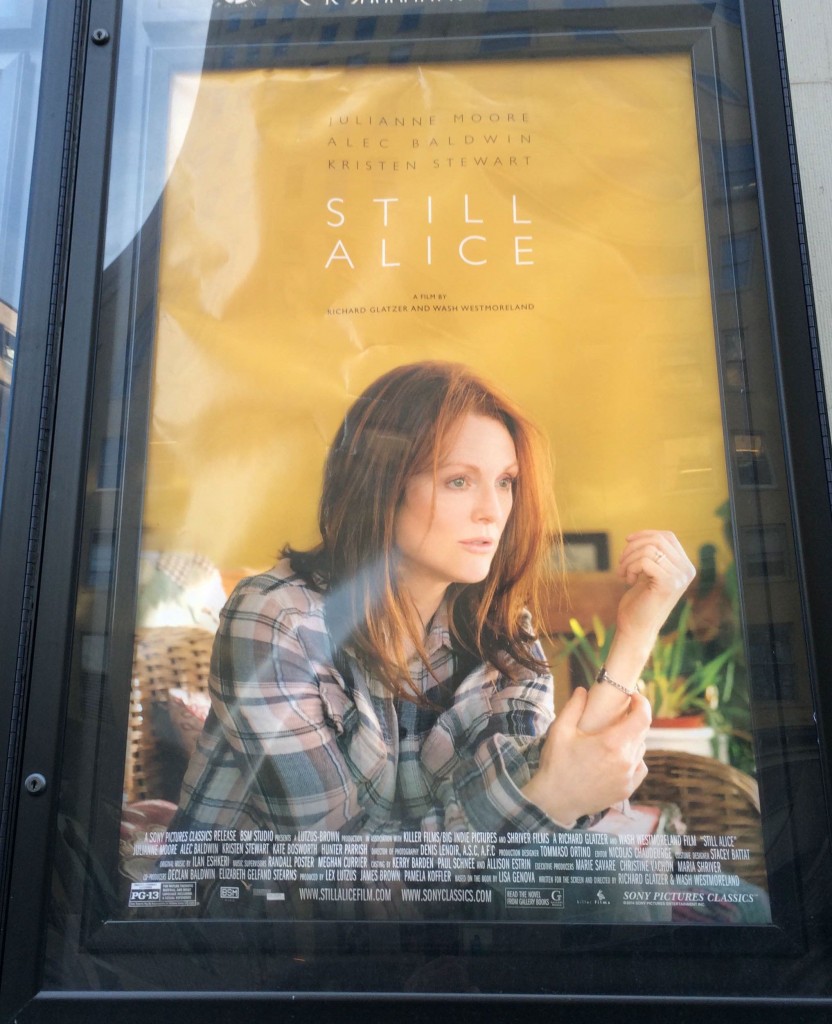by Kim Keller
I was so excited to go to the movies last Saturday to see Still Alice, the acclaimed adaptation of Lisa Genova’s wonderful debut novel of the same name from 2007, one of my all-time favorite books. And I wasn’t remotely disappointed.
Still Alice is an eye-opening and heartbreaking story about Alice Howland, movingly portrayed by Julianne Moore. Alice is a world-renowned linguistics professor, teaching at an Ivy League university and lecturing all around the world. She is in a seemingly happy marriage, with an attentive husband (played by Alec Baldwin) and three grown children. In other words, Alice is in the prime of her life, until small uncharacteristic memory lapses start to happen.
It begins with brief little moments, like forgetting what she’s about to say or overlooking an appointment. Then one day it escalates. Alice suddenly becomes disoriented while she’s jogging and can’t find her way back home. After the episode has passed, Alice realizes that she had been “lost” right smack in the center of the college campus where she has taught for years. The experience leaves her so shaken and scared that she knows she needs medical intervention. But nothing prepares her for the diagnosis she receives: early-onset Alzheimer’s disease.
I know it may seem hard to imagine loving a movie about someone who is, in effect, losing her mind. It is painful to watch Alice despair as she falls deeper into the grasp of Alzheimer’s indignities. We watch her struggle to fight off the advances of the disease, and her attempt to maintain as much of her life and identity as she possibly can. She uses her cell phone alarms to help her manage her day, and she becomes consumed with memory games. One night as Alice is cooking dinner, we watch her write three words on a little chalkboard in her kitchen. After she writes down the words, she covers them up, sets the timer for five minutes, and walks away to continue making dinner. When the timer goes off, she walks back over to the chalkboard trying to recount those three words, challenging her memory as she uncovers the board. Then she erases the words and quickly writes down three more. Back and forth, back and forth, she goes.
But even with all the heartache, Still Alice is equal parts intrigue, inspiration and fascination. I recognize that fascination might seem like an odd word to use here, but both the film and book allow the viewer and reader the unusual perspective of experiencing the disease from Alice’s point of view. Usually Alzheimer’s is described by medical professionals or by caregivers, but this is Alice’s story, and she gives us a uniquely intimate seat.
I believe the movie strikes a chord because so many people fear what every little memory lapses might mean as they age. I found myself playing the memory games right along with Alice, and I was actually relieved when I got the answers right.
Although Alice needs to relinquish her university position, she nonetheless teaches us all a few valuable lessons about life. She shows us the importance of living in the moment — even after most of her memories and her identity have slipped away, we can see the joy she feels holding her newborn grandchild.
She teaches us how to support, and even engage with, someone diagnosed with dementia. There is a moment in the movie when Alice’s youngest daughter, Lydia, played by Kristen Stewart, asks Alice what it feels like to have Alzheimer’s. At the end of the discussion, Alice thanks Lydia for asking. That touched me. It made me realize how isolated Alice must feel throughout this ordeal, and how grateful she was that someone was actually asking her what she was experiencing.
And, lastly, we learn how someone faces the end of her life with grace and dignity. Alice knows what’s coming, she knows that her time is limited, but she doesn’t avoid talking about it, or waste time wallowing in sorrow or pity. Instead she keeps going, she engages those around her and she continues to make plans for her highly uncertain future.
Near the end of the movie, Alice courageously gives a moving speech to an Alzheimer’s organization. “And I have no control over which yesterdays I keep and which ones get deleted,” she says. “This disease will not be bargained with. I can’t offer it the names of the US presidents in exchange for the names of my children. I can’t give it the names of state capitals and keep the memories of my husband . . . My yesterdays are disappearing, and my tomorrows are uncertain, so what do I live for? I live for each day. I live in the moment. Some tomorrow soon, I’ll forget that I stood before you and gave this speech. But just because I’ll forget it some tomorrow doesn’t mean that I didn’t live every second of it.”
With tears in my eyes, I nearly jumped up out of my seat to give Alice a heartfelt standing ovation. I wasn’t alone. Alice and her story are simply unforgettable.
Kim Keller is the Co-Founder of In Care of Dad. She lives and works in New York City.
Photo by John David Decker.
Tags: Alzheimer's, Julianne Moore, Still Alice






